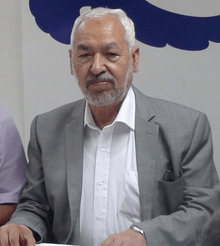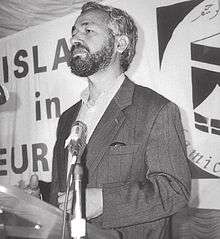Rached Ghannouchi
| Rached Ghannouchi راشد الغنوشي | |
|---|---|
 | |
| Born |
June 7, 1941 El Hamma, Tunisia |
| Alma mater |
Cairo University Damascus University |
| Political party | En-Nahda Movement |
| Website |
www |
Rached Ghannouchi (Arabic: راشد الغنوشي Rāshid al-Ghannūshī; born June 7, 1941), also spelled Rachid al-Ghannouchi or Rached el-Ghannouchi, is a Tunisian politician and thinker,[1] co-founder of the Ennahdha Party and serving as its "intellectual leader".[2] He was born Rashad Khriji (راشد الخريجي).[3]
Ghannouchi was named one of Time's 100 Most Influential People in the World in 2012[4] and Foreign Policy's Top 100 Global Thinkers[5] and was awarded the Chatham House Prize 2012 (alongside Tunisian President Moncef Marzouki) by Prince Andrew, Duke of York, for "the successful compromises each achieved during Tunisia's democratic transition".[6][7]
Early life
Ghannouchi was born outside El Hamma, in the governorate of Gabès in southern Tunisia. His village had no electricity or paved roads. His father was a poor farmer with children including Rached. His family worked in the fields every day, and had meat to eat only a few times a year.[8] After the ground season had ended, the family wove baskets from palm leaves to suppliment its income. Rached was able to attend a local branch of the traditional Arabic-language Zaytouna school thanks to financial help from an older brother.[8]
He received his certificate of attainment degree, equivalent to the Baccalauréat, in 1962 from the University of Ez-Zitouna (Zaytouna). He entered the school of agriculture at Cairo University in 1964 but, following the expulsion of Tunisians from Egypt, he left for Syria. He studied philosophy at the University of Damascus, graduating in 1968. Ghannouchi also spent some time in his 20s traveling and working in Europe as a grape picker and dish washer.[9]
Islamic Tendency Movement
In April 1981 Ghannouchi founded the Islamic Tendency Movement (Arabic: حركة الاتجاه الإسلامي Ḥarakat al-Ittijāh al-Islāmī). The Movement described itself as specifically rooted in non-violent Islam, and called for a "reconstruction of economic life on a more equitable basis, the end of single-party politics and the acceptance of political pluralism and democracy."[10] By the end of July, Ghannouchi and his followers were arrested, sentenced to eleven years in prison in Bizerte, and were tortured. Both the religious and secular community, including numerous secular political organizations, rallied in his support.[11] While in prison he translated a number of works and wrote on topics such as democracy, women's rights, and Palestine. He also wrote his most noted work, Al‐Hurriyat al‐’Ammah (Public Liberties).[12]
He was released in 1984, but returned to prison in 1987 with a life sentence, then was again released in 1988. He moved to Europe (the United Kingdom) as a political exile, where he lived for decades.[2]
He attended The Islamic Committee for Palestine conference in Chicago in 1989.[13] Following the 1990 invasion of Kuwait, Al-Ghannushi denounced King Fahd of Saudi Arabia for the "colossal crime" of inviting the U.S. to deploy forces.[14] He also called for a Muslim boycott of American goods, planes and ships.[14] He has also been criticized for calling for jihad against Israel.[15][16][17]

Ghannouchi continued to criticise Tunisian politics and the regime of President Zine El Abidine Ben Ali.[18]
Tunisian Revolution and after
Following popular unrest in which Ben Ali was ousted, Ghannouchi returned to Tunisia on 30 January 2011, after spending twenty two years exiled in London,[19] with thousands[20] of people welcoming him.
His party won 37.04% of the vote (more than the next four biggest vote-getting parties combined)[21] in the 2011 Tunisian Constituent Assembly election. Ghannouchi did not take a government position. Ennahdha's secretary-general Hamadi Jebali became Prime Minister.[22]
Ennahda formed a government which was criticized for mediocre economic performance, not stimulating the tourism industry, and poor relations with Tunisia's biggest trading partner France. In particular it was criticized for allowing aggressive Islamisation by radical Islamists who were blamed for, among other things, demanding Sharia law, denouncing gender inequality and restrictions on polygamy,[23] the 2012 ransacking and burning of the American embassy, and the assassination of two leftist politicians Chokri Belaid (in February 2013) and Mohamed Brahmi (in July 2013). During this 2013–14 Tunisian political crisis enraged secularists demanded the government step down or even a Sisi style coup, while Ennahda militants defiantly opposed early elections, even booing Ghannouchi's calls for sacrifice for national unity.[24]
Nonetheless Ghanouchi worked with secularist leader Beji Caid Essebsi to forge a compromise and on October 5 signed a "road map" whereby Ennahda would step down for a caretaker government after the new constitution was agreed upon and until new elections were held.[25] Both leaders were heavily criticized by their party rank and file and Ghannouchi received agreement from the Ennahda shura council only by threatening to resign.[26] Outside observers called it a "model transition".[27]
In January 2014, after the new Tunisian Constitution was approved, Ennahdha peacefully quit government and handed power to a technocratic government led by Mehdi Jomaa. Ennahda placed second in the October 2014 parliamentary election with 27.79% of the popular vote and formed a coalition government with the larger secularist party Nidaa Tounes despite rank-and-file opposition.[28] Ennahda did not put forth a presidential candidate for the November 2014 election.[29] Ghanouchi "hinted broadly" that he personally supported Beji Caid Essebsi[30] (who won with over 55% of the vote).
Ghannouchi argued for these accommodating measures against more purist party members on the grounds that the country was still too fragile, and the economy too much in need of reform, for Ennahda to be in opposition.[28] Ghannouchi also gave his support to a crackdown on jihadi indoctrination at radical mosques (over 60 civilians, mostly tourists, were killed in 2015 by jihadis, devastating Tunisia's tourist industry). Despite his Islamist background, he had always been "reviled" by jihadis, according to Robert Worth, and now appeared near "the top" of the jihadi "wanted list".[31]
BBC apology in 2013
On 17 May 2013, the BBC published an apology on their website for previously publishing inaccurate statements about Ghannouchi six months earlier on 21 November 2012.[32] The article had accused Ghannouchi of threatening to order troops on to the streets if the Ennahdha Party did not get the results he expected in the elections in 2011, and suggested he condoned the violent Salafist attack on the United States embassy and the burning of the American School in Tunis in September 2012.[32] Acknowledging that none of these accusations and suggestions were in fact true, the retraction concluded: "The BBC apologises to Mr Ghannouchi for these mistakes and for the distress they caused him."[32]
Views and background
Ghannouchi's willingness to compromise with secularists in Tunisia and his country's unique success in maintaining a democratic system following the Arab Spring has been credited by at least one observer (Robert Worth) to his background. Unlike many Islamists, Ghannouchi "lived abroad for decades, reading widely in three languages", including Western thinkers Karl Marx, Sigmund Freud and Jean-Paul Satre. He admired the courage of leftists who protested in the streets against the dictatorship, were arrested and tortured in prison, and became willing to work with them.[9] Watching the initial victory of the Algerian Islamists—while exiled in London—collapse into the slaughter, mayhem and defeat of the civil war, left a deep impact.[33] According to Azzam S. Tamimi, he was influenced by Malik Bennabi and his treatise “Islam and Democracy”, which laid "the foundations" for Ghannouchi's "masterpiece" Al‐Hurriyat al‐’Ammah (Public Liberties).[12]
In 2002, an unsympathetic Western source (Martin Kramer) described him as differing "from other Islamists" in his insistence "that Islam accepts multi-party democracy."[1]
In 2015, he told French journalist Olivier Ravanello that homosexuality should not be criminalized, though he opposed gay marriage.[34]
Awards

- One of the first in FP Top 100 Global Thinkers in 2011.
- The Chatham House Prize from Chatham House for the year 2012 in London (with Moncef Marzouki).
- The Ibn Rushd Prize for Freedom of Thought for the year 2014 in Berlin.
- Lifetime membership of Aligarh Muslim University Students' Union in 2015.[35][36]
References
- 1 2 Kramer, Martin (Fall 2002). "Rachid Ghannouchi: A Democrat within Islamism". Middle East Quarterly. 1 (4). Retrieved 18 October 2016.
- 1 2 Feldman, Noah (2011-10-30). "Islamists' Victory in Tunisia a Win for Democracy: Noah Feldman". Bloomberg. Retrieved 2011-10-31.
- ↑ Turess Press. "إلى الأستاذ راشد الخريجي (حركة النهضة)". Retrieved 16 June 2013.
- ↑ Time Magazine (18 April 2012). "TIME 100: The List". Time Magazine. Retrieved 14 February 2013.
- ↑ Foreign Policy. "The FP Top 100 Global Thinkers 2011".
- ↑ Chatham House. "Chatham House Prize 2012".
- ↑ Ghannouchi, Rached. "Transcript of speech at Chatham House Prize 2012 awards ceremony, 26 November 2012" (PDF).
- 1 2 Worth, Robert F. (2016). A Rage for Order: The Middle East in Turmoil, from Tahrir Square to ISIS. Pan Macmillan. pp. 203–4. Retrieved 31 July 2016.
- 1 2 Worth, Robert F. (2016). A Rage for Order: The Middle East in Turmoil, from Tahrir Square to ISIS. Pan Macmillan. pp. 207–8. Retrieved 31 July 2016.
- ↑ Kechichian, Joseph A. (September 16, 2011). "A genuine Islamist democrat". Gulf News. Retrieved 18 October 2016.
- ↑ Linda G. Jones, "Portrait of Rashid Al-Ghannoushi" Middle East Report, No. 153 (July–August 1988).
- 1 2 "Rachid Ghannouchi: A Democrat Within Islamism. The Question of Democracy, Azzam S. Tamimi". Oxford Scholarship Online. Retrieved 18 October 2016.
- ↑ "Islamic Jihad Movement in Palestine" (PDF).
- 1 2 "A U.S. Visa for Rachid Ghannouchi?".
- ↑ Merley, Steven (October 13, 2014). "Tunisian Muslim Brotherhood Leader Speaks In Washington; Rachid Ghannouchi Has Long History Of Extremism And Support For Terrorism". Global Muslim Brotherhood Daily Watch. Retrieved 18 October 2016.
- ↑ "Rachid Ghannouchi". Global Muslim Brotherhood Daily Watch. Retrieved 18 October 2016.
- ↑ "Rachid Ghannouchi: A Democrat Within Islamism. Ghannouchi's Detractors, Azzam S. Tamimi [summary]". Oxford Scholarship Online. Retrieved 18 October 2016.
- ↑ Kirkpatrick, David D.; Fahim, Kareem (18 January 2011). "More Officials Quit in Tunisia Amid Protests". The New York Times. Retrieved 19 January 2011.
- ↑ راشد الغنوشي زعيم حركة النهضة يعود إلى تونس اليوم بعد 20 عاما في المنفى (in Arabic). Asharq Al-Awsat. 30 January 2011.
- ↑ "Rached Ghannouchi de retour à Tunis après 20 ans d'exil : un accueil exceptionnel". Leaders. 30 January 2011. Retrieved 30 January 2011.
- ↑ Gerges, Fawaz (June 2012). "The Many Voices of Political Islam" (PDF). The Majalla. 1573: 14–18. Retrieved 4 April 2013.
- ↑ Mzioudet, Houda (14 December 2011). "Ennahdha's Jebali Appointed as Tunisian Prime Minister". Tunisia Live. Retrieved 21 December 2011.
- ↑ Osman, Tarek (2016). Islamism: What it Means for the Middle East and the World. Yale University Press. p. 85. Retrieved 16 October 2016.
- ↑ Worth, Robert F. (2016). A Rage for Order: The Middle East in Turmoil, from Tahrir Square to ISIS. Pan Macmillan. pp. 199–204. Retrieved 31 July 2016.
- ↑ Worth, Robert F. (2016). A Rage for Order: The Middle East in Turmoil, from Tahrir Square to ISIS. Pan Macmillan. p. 206. Retrieved 31 July 2016.
- ↑ Worth, Robert F. (2016). A Rage for Order: The Middle East in Turmoil, from Tahrir Square to ISIS. Pan Macmillan. pp. 205, 207. Retrieved 31 July 2016.
- ↑ Markey, Patrick; El Yaakoubi, Aziz (9 January 2014). "Tunisian premier resigns for caretaker government, protests hit south". Reuters. Retrieved 17 October 2016.
- 1 2 Worth, Robert F. (2016). A Rage for Order: The Middle East in Turmoil, from Tahrir Square to ISIS. Pan Macmillan. p. 218. Retrieved 31 July 2016.
- ↑ "Tunisia's main Islamist party to stay out of presidential election". Reuters. 8 September 2014. Retrieved 20 September 2014.
- ↑ Worth, Robert F. (2016). A Rage for Order: The Middle East in Turmoil, from Tahrir Square to ISIS. Pan Macmillan. p. 219. Retrieved 31 July 2016.
- ↑ Worth, Robert F. (2016). A Rage for Order: The Middle East in Turmoil, from Tahrir Square to ISIS. Pan Macmillan. p. 220. Retrieved 31 July 2016.
- 1 2 3 "Apology to Rached Ghannouchi". BBC.co.uk. 17 May 2013. Retrieved 27 May 2013.
- ↑ Worth, Robert F. (2016). A Rage for Order: The Middle East in Turmoil, from Tahrir Square to ISIS. Pan Macmillan. p. 209. Retrieved 31 July 2016.
- ↑ Guizani, Emna (April 20, 2015). "News Rached Ghannouchi: Homosexuality Should Not Be Criminalized". tunisia-live.net. Retrieved 17 October 2016.
- ↑ "Tunisia's Ghannushi is member of AMU students' union". The Times of India. Retrieved 2016-05-12.
- ↑ "'Tunisia proof that democracy can sustain in Arab world'". 2015-04-08. Retrieved 2016-05-12.
Further reading
- Tamimi, Azzam (2001). Rachid Ghannouchi: a democrat within Islamism. New York: Oxford University Press. ISBN 0-19-514000-1.
- Saeed, Abdullah (1999). "Rethinking citizenship rights of non-Muslims in an Islamic State; Rashid al-Gannushi's contribution to the evolving debate". Islam and Christian Muslim Relations. 10 (3): 307–323 [p. 311].
- alhiwar.net 6 May 2007
- Jones, Linda G. (1988). "Portrait of Rashid al-Ghannoushi". Islam and the State. Middle East Report. 153. New York: Middle East Research and Information Project. pp. 19–22.
- al-Ghannoushi, Rashid & Jones, Linda G. (1988). "Deficiencies in the Islamic Movement". Islam and the State. Middle East Report. 153. New York: Middle East Research and Information Project. pp. 23–24.
External links
| Wikimedia Commons has media related to Rached Ghannouchi. |
- Official website
- Interview with Rachid Ghannouchi
- The Nahdha Party
- Al-Hiwar forums and news
- Works by or about Rashid Ghannushi in libraries (WorldCat catalog)
- Rachid al-Ghannouchi collected news and commentary at Al Jazeera English
- Rashid Al-Ghannoushi: Ben Ali's regime aims to destroy Tunisian people's Islamic opposition, identity, Khaled Hamza, Ikhwanweb, 2 November 2006, interview
- Rashid al-Ghannushi, A Leader of Pure Islam, Rohama, 27 January 2011
- Rachid Ghannouchi, the Islamist Who Believes in Inclusion and Compromise – Fanack Chronicle